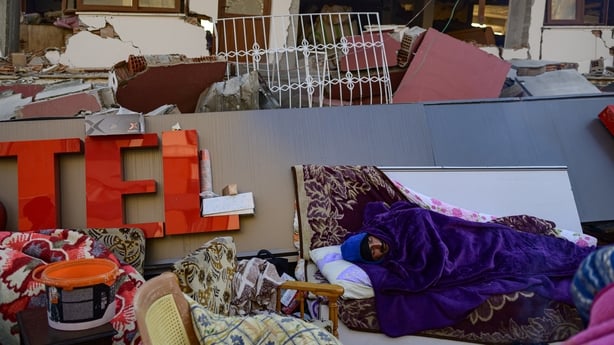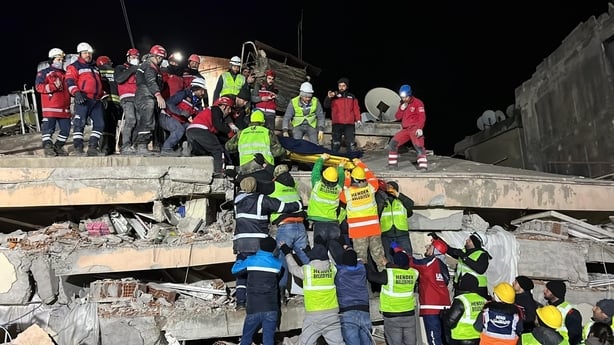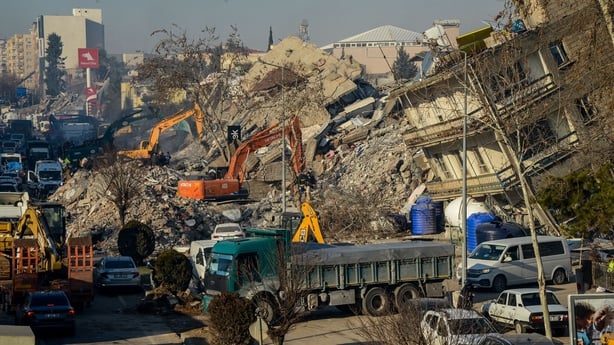Rescuers pulled out children from the rubble of the Turkey-Syria earthquake as the death toll passed 23,000, and a winter freeze compounded the suffering for nearly one million people estimated to be in urgent need of food.
The stench of death hung over Turkey's eastern city of Kahramanmaras - the epicentre of the first 7.8-magnitude tremor that upturned millions of lives in a remote region filled with people displaced by war in the pre-dawn hours of Monday.
The United Nations warned that 874,000 people were now in urgent need of hot meals across Turkey and Syria.
Five days of grief and anguish have been slowly building into rage at the Turkish government's response in the face of the country's most dire disaster in nearly a century.
Turkish President Recep Tayyip Erdogan conceded for the first time today that his government was not able to reach and help the victims "as quickly as we had desired".
But miraculous rescues continued in pockets of Turkey more than 100 hours after the first tremor tore apart roads and flattened hundreds of buildings while a winter storm raged over southeastern Turkey and parts of Syria.
Turkish television showed rescuers pulling out a family of four - a mother and her three children - from the pile of rubble 108 hours after the disaster in the Syria-border province of Hatay.
People's survival chances fall greatly after the first 72 hours because of the cumulative effects of dehydration and cold.
Three-year-old Zeynep Ela Parlak was also rescued in the same province today.
Rescuers pulled a 10-day-old baby and his mother out alive after 90 hours trapped in Hatay yesterday.
Meanwhile, the World Food Programme (WFP) is running out of stocks in northwest Syria and called to open more border crossings from Turkey after both countries were ravaged by earthquakes, the UN food aid organisation has said.
"Northwest Syria, where 90% of the population depends on humanitarian assistance, is a big concern. We have reached the people there, but we need to replenish our stocks," Corinne Fleischer, WFP Regional Director in the Middle East, Northern Africa and Eastern Europe, told reporters.
"We are running out of stocks and we need access to bring new stocks in. The border crossing is open now, but we need to get new border crossings open."
Currently, there is only one open crossing, at Bab al-Hawa, between Turkey and the opposition-held northwest Syria. It was shut briefly after Monday's massive earthquake and aftershocks, but reopened yesterday.
The International Organisation for Migration said that 14 trucks carrying humanitarian aid, including electric heaters, tents, blankets, had crossed into northern Syria from Turkey on Friday.
Six trucks carrying UN aid made it across the border yesterday.

Ms Fleischer stressed that opening a second border crossing was essential to getting aid to northwest Syria.
"We need the second opening because of the delay of the transport to the damaged roads," she said.
"We were able to manage with this in the circumstances before the quake, now we are not anymore. We need both crossings to be open."
The White Helmets rescue group that operates in rebel-held areas had expressed disappointment at the first batch of aid, saying it was part of "routine" deliveries.
"This is certainly not special aid and equipment for search and rescue teams," the group said on Twitter.
"This makes us very disappointed at a time when we are desperate for such equipment to help us save lives from under the rubble."
A Turkish official said that Ankara is discussing re-opening a border crossing into Syrian government territory and also looking at opening another into Syria's opposition-held Idlib region.
NATO members have agreed to deploy shelters to its ally Turkey to help provide accommodation for those left homeless. The "semi-permanent" shelters are usually used by NATO forces as headquarters for military operations and exercises.
"NATO stands in strong solidarity with our ally Turkiye, and the deployment of these shelter facilities will help to save lives," said alliance secretary general Jens Stoltenberg.
The shelters can be equipped with a number of amenities including heating, power generators and medical treatment areas, NATO said.
Read more:
GOAL confirms 27 of its staff killed in quake
'World forgot about Syria,' says WHO as aid trickles in
Turkish barber in Galway overwhelmed with donations after earthquake
Familiar with tragedy, Turkey miners rush to help after quake
'Darkest levels of hell'
Father Tony O'Riordan, a Catholic priest based in Aleppo with the Jesuit Refugee Service, has called for western governments to "pump aid in here very quickly".
He told BBC Radio 4's World At One programme: "If we were in hell before the earthquake, we are now in the darkest levels of hell, where parts of the city that were devastated by the war, where the infrastructure was degraded, new buildings have collapsed and new buildings have become unsafe."
The Irishman said displaced people had resorted to sleeping in their cars in sub-zero conditions, while thousands are in the 120 or so emergency shelters set up in the city, where some aid, such as blankets, "patchy" hygiene access and medical care is being provided.
Fr O'Riordan added: "There is a reasonable level of response but it needs to be ramped up, particularly in light of us being in the coldest period of winter, with all the associated risks.
"Aleppo has also been the epicentre of a cholera outbreak since September and with the degradation of the water system because of the earthquake, there is a risk of a spike in cholera cases.
"So there is some response but there is a huge response needed from outside of Syria. Most of the aid that is arriving right now to Aleppo is arriving from Syria.
"What we need is the support of civil organisations and governments of the West to pump aid in here very quickly."
Hundreds of thousands of people in both countries have been left homeless in the middle of winter.
Many people have set up crude shelters in supermarket car parks, mosques, roadsides or amid the ruins.
Survivors are often desperate for food, water and heat.
Some 40% of buildings in the Turkish city of Kahramanmaras, the epicentre of Monday's main quake, are damaged, according to a report by Turkey's Bogazici University.

At a petrol station near the Turkish town of Kemalpasa, people picked through cardboard boxes of donated clothes. In the port city of Iskenderun, Reuters journalists saw people huddle dround fires on roadsides and in wrecked garages and warehouses.
Authorities say some 6,500 buildings in Turkey collapsed and countless more were damaged.
The death toll in Turkey rose to 17,674 by last night, Vice President Fuat Oktay said. In Syria, already devastated by nearly 12 years of civil war, more than 3,300 people have died, according to the government and a rescue service in the rebel-held northwest.
In the devastated Syrian town of Jandaris, Ibrahim KhalilMen kaween walked in the rubble-strewn streets clutching a white body bag. He said he had lost seven members of his family, including his wife and two brothers.
"I'm holding this bag for when they bring out my brother, and my brother's young son, and both of their wives," he said. "The situation is very bad. And there is no aid."
13.5m people displaced in Turkey
Turkish officials say some 13.5 million people were affected in an area spanning roughly 450km from Adana in the west to Diyarbakir in the east. In Syria, people were killed as far south as Hama, 250km from the epicentre.
Rescue crews working in the dark and in freezing temperatures looked for survivors at a collapsed building in the city of Adiyaman, Turkish broadcasters showed.
Teams called for silence, asking all vehicles and generators to stop and reporters to keep quiet as they listened for any sound of life from the mangled concrete.
Many in Turkey have complained of a lack of equipment, expertise and support to rescue those trapped - sometimes even as they could hear cries for help.

Greece sent thousands of tents, beds and blankets and Israeli satellite intelligence was helping map the disaster zones in Turkey with technology predominantly used for special operations, the Israeli military said.
The World Bank is providing Turkey with $1.78 billion in relief and recovery financing, $780 million of which will become available immediately. The US Agency for International Development will provide $85 million in urgent humanitarian assistance to Turkey and Syria.
